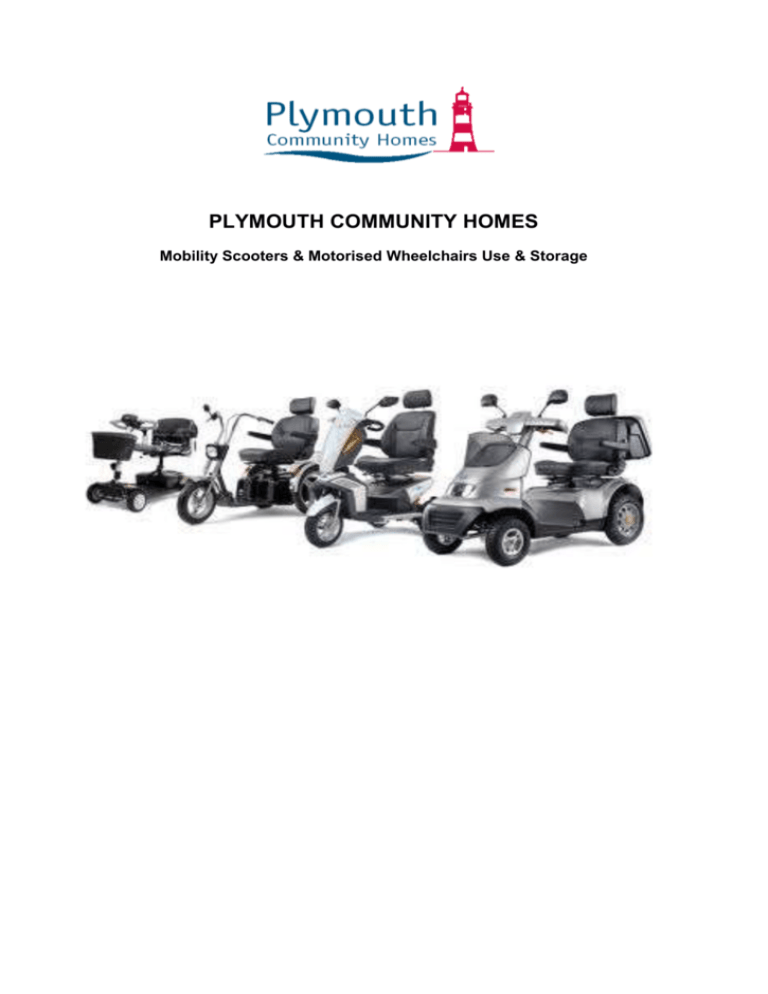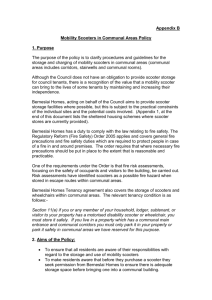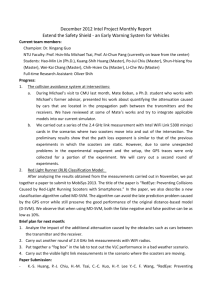Mobility Scooters Policy - Plymouth Community Homes
advertisement

PLYMOUTH COMMUNITY HOMES Mobility Scooters & Motorised Wheelchairs Use & Storage Introduction Due to the widespread expansion in the use and availability of motorised scooters/buggies/wheelchairs ( mobility scooter), their popularity is now beginning to create issues in premises which were not designed to accommodate such vehicles. Plymouth Community Homes understands the benefits that these vehicles can provide and wishes to support all of our tenants and residents to retain their independence as much as is possible. However, the safety of all tenants, residents, staff and visitors is a priority. Whilst some tenants and leaseholders may wish to leave their mobility scooters in the communal areas of blocks of flats, this potentially raises a number of Health & Safety and Fire Safety issues. For this reason this policy is aimed at reducing that risk whilst at the same time offering positive guidance to those tenants with mobility scooters. Mobility scooters Involved in fire can release large volumes of highly toxic smoke and gases. If stored in shared corridors and staircases (sterile areas) a fire in a mobility scooter could affect the means of escape and place an unacceptable risk to all occupiers within the building. PCH is mindful that under current fire safety legislation (Regulatory Reform (Fire Safety) Order 2005) the expectation is that all common areas to flats (shared corridors, open balcony’s and staircases) are risk assessed and all risks and hazards eliminated for the overall safety of occupants. This risk assessment has been undertaken by a competent firm of fire risk assessors. Their advice is that mobility scooters should not be allowed to be stored, parked or charged within the common areas of flats due to the risks mentioned above. With the exception Of Innis House none of PCH’s housing schemes has been specifically designed or adapted to accommodate the storage, charging of mobility scooters. This means that if tenants cannot accommodate a scooter within their own home there may not be the necessary space within the communal areas of the schemes to safely store it. Finding secure storage and charging areas for these vehicles is particularly difficult in communal schemes where safe access and fire safety is paramount. It is also important that these vehicles are not stored where they present a safety risk and or nuisance to other residents and users. The Dangers of Mobility Scooters The first picture below has been taken from the Birmingham Post (May 2010) and as a result of this fire Albert and Kate Adams both died (both 77) as the fire spread into the property via the adjacent window. It should be noted that both of the photographs below depict fires that occurred in the open air. Fires within confined spaces i.e. the common areas of buildings (corridors and staircases) will develop greater levels of smoke and the heat radiated in the corridor etc will be much greater. This coupled with the principle that common areas of flats should not be fitted with automatic fire detection then any fire in a corridor has the potential to develop undetected for a considerable period of time. Fire Service Recommendations (Devon & Somerset Fire & Rescue Service) The principal “advice” to housing providers is that mobility scooter’s should not be stored/parked/charged in staircase enclosures, or communal corridors forming part of means of escape routes within buildings. This is because they introduce a considerable fire loading and the scooters can be an obstruction hazard within these areas. Bearing in mind the “advice” of the Fire Service above. As the enforcing authority for the Fire Safety Order they would expect this to be the minimum standard and as such PCH could run the risk of enforcement / prosecution against them. Additionally there is the possibility that the individual who has breached their tenancy/leaseholder conditions ( and linked policies) may also be subject as an individual for the breach of the Fire Safety Order and as such be liable to prosecution. Aims of the policy The aim of this policy is to protect and preserve the health and safety of all residents living within PCH housing schemes and anyone else visiting or working there, whilst enabling the use of mobility scooters to promote independence. This policy is in place to give tenants and leaseholders information and advice on Plymouth Community Homes’ approach to managing the use of mobility scooters. It applies to both general needs flats, maisonettes and sheltered housing blocks to existing tenants who already own or may wish to purchase a scooter and also to applicants with scooters who are considering moving into a PCH scheme. The term ‘mobility scooter’ used throughout this policy refers to all types of battery powered vehicles. PCH encourages the rights of tenants to independent living. It also recognises that mobility scooters can and does enhance the quality of life for those people who may otherwise be limited in their ability to access facilities, either within a scheme or the wider community. Where possible PCH will work with residents to enable their use of a mobility scooter. However, the health and safety of other residents is paramount and permission cannot be given to store mobility scooters in communal areas. We will strive to be as flexible as possible and where there is a risk associated with the storage or use of a mobility scooter we will work with the resident to try and find a solution. The provision of storage & charging facilities for mobility scooters within PCH properties is challenging and sometimes impossible, as there is often no suitable space for storage or recharging facilities available. Where space is available, adaptation or providing adequate facilities can be costly and would need to be planned and budgeted for. PCH reserves the right to prohibit or restrict the use and storage in any of its schemes of any residents' personal possessions and equipment deemed to be unsuitable for the accommodation and communal areas. The type and nature of such possessions and equipment will be decided by PCH from time to time. The storage and use of mobility scooters within PCH schemes falls into this category. Policy – Guidance Details All enquiries with regard to use and storage of mobility scooters will be dealt with in a sympathetic manner in order for PCH to meet its obligations and to ensure certain minimum requirements are met. The application of this policy lies with the Housing and neighbourhoods teams. It will be the responsibility of the Housing officer or Sheltered Housing officers to allow the scooter being allowed on the premises subject to the guidance/criteria as set out below within the section “Key Principles” New Scooters (Existing or new tenants) Existing/New tenants or leaseholders wishing to buy a mobility scooter (either new or second-hand) should, prior to purchase, discuss, and agree with the Housing Officer/Sheltered staff as to where they propose store & recharge it. Existing Scooters The basic principle for the use of a mobility scooters is that it will normally be kept within a tenants or Leaseholders own property or for them to provide storage external to the common corridors or staircases, and is the responsibility of the tenant to keep it maintained and recharged. If there is a scooter currently in a communal area, and it is not evident who owns it, the Housing/sheltered Officer should attach a note to it asking the owner to make contact or it will be removed after a set period of time. Where the owner is known, the tenant should be informed of the Health & Safety and Fire risks associated with storing/parking/charging the scooter in communal areas and advised that it should be stored/parked/charged within their own accommodation and not left in the communal. Adaptations to properties For those tenants who can demonstrate a specific need for a mobility scooter supported by recommendation from an occupational therapist or similar profession they can make application to the Disability Adaptation Officer to seek assistance in any internal/external adaptation to their property. Each application will be considered independently. For those leaseholders who can demonstrate a specific need for a mobility scooter supported by recommendation from an occupational therapist or similar profession they can make application to the Disability Adaptation Officer to seek permission for adaptation to the property. Each application will be considered independently. Funding may be available either from charitable sources i.e. The British Legion or Disabled Facilities Grant (for leaseholders, although it is means tested). Key Principles for the use of mobility scooters within PCH housing schemes The storage, parking or charging of a scooter within a common corridor or staircase enclosure is prohibited PCH may prohibit a tenant from using a mobility scooter in a scheme if, by their general disregard for safety, they place other scheme residents, visitors and property at risk. Mobility scooters & wheelchairs are normally kept within a tenants own property, and is the responsibility of the tenant to keep it maintained and recharged. The practice of trailing wires across a corridor/escape route from a property to a scooter for charging purposes is prohibited. The ability of a tenant to get either on or off a mobility scooter must be achieved without assistance from PCH staff. Scooters should not be driven within any enclosed corridor faster than a walking pace. The use of the scooter should be limited to enable the user to travel from the front door of the building to their flat entrance door. They should not be used in lounges, laundries, and storage areas etc where they can cause obstructions for other users. The storage of a scooter external to any scheme must be in such a manner that it does not cause any health and safety issues to any other residents, visitors or threaten the fabric of the building. Where storage and charging facilities have been provided by PCH and the resident prefers to use these facilities rather than store there vehicle within their own home then the user will be subject to a service charge for the storage and charging costs. Insurance and damage Insurance for mobility scooters is not mandatory by law however all residents of PCH will be required to show evidence of insurance annually covering , personnel injury to others, damage to the property in the event of accidents, misuse or fire. Failure to produce insurance will result in a breach of tenancy/lease and you will be asked to remove the scooter from the scheme permanently. Insurance covering damage etc. within the residents dwelling should be covered in the normal manner (contents insurance etc.) . Housing/Sheltered housing officer’s will review the safe use, operation, storage and recharging of scooters/motorised wheelchairs as and when necessary. If a resident has been found to be causing damage to PCH property the resident may be charged for the repair ( in particular damage to carpets , wall decoration and door frames within the common areas of the building). Information note - storage of mobility scooters Where it is not possible to store scooters in the tenant’s or Leaseholders home or within a suitable room within/outside of the building. Example of options External Waterproof Covers – This option depends if there is space outside the tenant’s home which will not cause an obstruction and where a power lead will not cause a trip hazard. We do understand these covers do not offer protection from theft. Manufactured Scooter Storage Units – This may be an option for those living on the ground floor or in dispersed schemes, it is a secure unit with built in battery chargers, planning permission may not be needed, however, this will need to be assessed by Housing staff also, to make sure it will not obstruct access paths or windows. A secure power connection to the tenant’s property would be required and a level surface available for the unit to be sited on. The cost of any of the above options will be at the tenant’s \ Leaseholders expense. Not being able to afford the solution cannot be allowed to override the safety issues of not having scooters in communal areas. Advice on storing scooters etc within your home. The scooter should be stored and charged within a room within the dwelling. The room should be fitted with a substantial door. When being stored or charged the door to the room should be kept closed. The room used for storage or charging should be fitted with a smoke detector – if the room chosen to store or charge the vehicle does not already have a smoke detector one should be fitted (this should be at the occupiers expense). Recharging should only be carried out during the day time hours and not over night and they should never be charged in the communal areas of the building Battery charging should be undertaken in a ventilated room (i.e. ensure the window to the room is open). Note – if charging a maintenance free battery (sealed battery) ventilation is not specifically required but would be best practice. The scooter should not be stored or charged within the hallway of the dwelling – in the event of a fire the vehicle should not compromise the occupant from reaching the flat entrance/exit door. If your scooter is to be stored for any length of time the battery should be removed. Equality and diversity PCH will apply this policy consistently and fairly, and will not discriminate against anyone on grounds of their racial or ethnic origin, disability, gender, religious belief, sexual identity, or any other relevant characteristic. PCH will make this policy available in other languages and formats on request. We will carry out an equality impact assessment on this policy, in line with our corporate procedure. Monitoring and review We will monitor this policy to ensure it meets good practice and current legislation and will review it in accordance with our review timetable for all policies.




